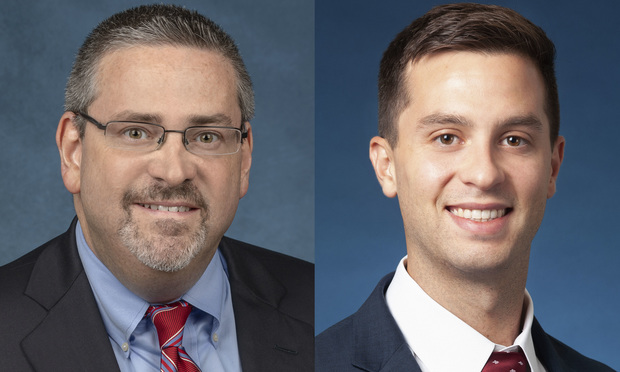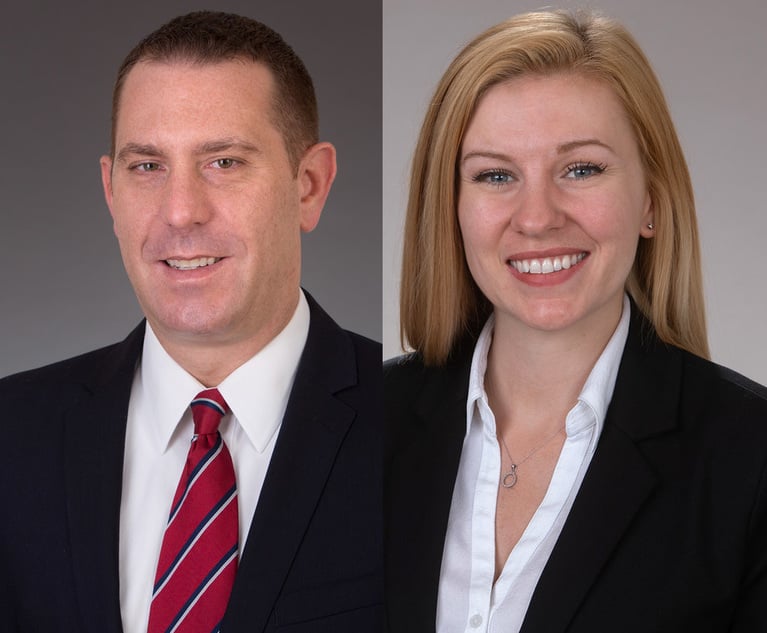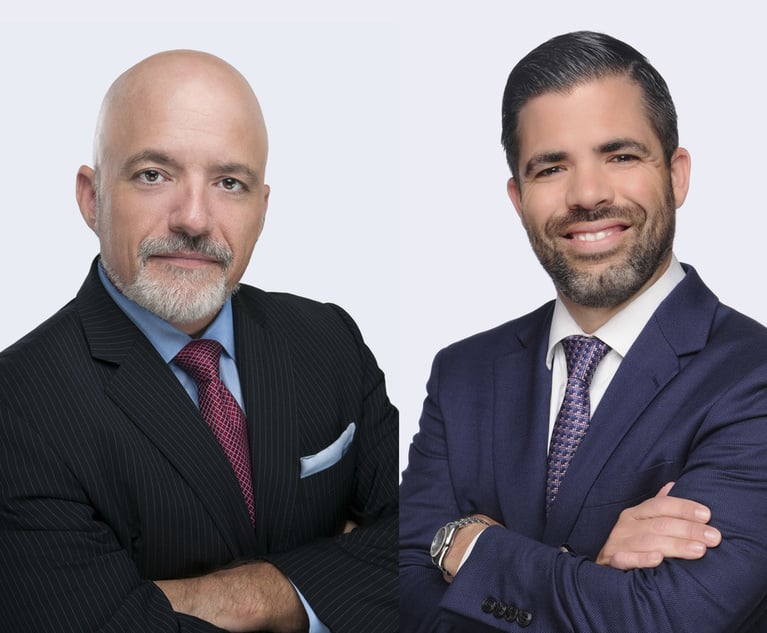COVID-19's Impact on the M&A Market: Measures and Precautions
Whether parties are moving forward with their agreements, placing them on the backburner until the markets stabilize, or initiating deals during the COVID-19 pandemic, both parties should prudently review deal terms and contemplate what must be revised to properly account both for the existing crisis and for the possibility of similar epidemics or pandemics in the future.
July 10, 2020 at 01:59 PM
6 minute read
 Perry Sofferman, partner with Kaufman Dolowich & Voluck in Fort Lauderdale, left, and Andrew Burnstine, associate with Wicker Smith in Orlando, right.
Perry Sofferman, partner with Kaufman Dolowich & Voluck in Fort Lauderdale, left, and Andrew Burnstine, associate with Wicker Smith in Orlando, right.
Although it is uncertain what impact the COVID-19 pandemic will have on the M&A market over the medium- and long-term, the severity of the short-term effects that COVID-19 is having on the M&A market is readily apparent. Whether parties are moving forward with their agreements, placing them on the backburner until the markets stabilize, or initiating deals during the COVID-19 pandemic, both parties should prudently review deal terms and contemplate what must be revised to properly account both for the existing crisis and for the possibility of similar epidemics or pandemics in the future.
In the context of M&A agreements entered into prior to the pandemic, there may be situations under which a court, considering all the factors, might find, in light of the global market implications surrounding the COVID-19 pandemic, that a "material adverse change" (MAC) or "material adverse effect" (MAE) occurred when it would not have done so under ordinary conditions. (Interchangeably MAC and MAE).
Straying Away From a Seller's Market
Immediately preceding the COVID-19 pandemic, the United States and global economies were in the midst of a 10-year bull run and one of the most seller-friendly markets in decades. During this run, agreement terms deemed to be leveled with the market increasingly became more seller-friendly, as sellers had several withdrawal opportunities at desirable valuations backed by an abundance of debt and equity capital. In fact, the MSCI World, S&P 500 and STOXX Europe 600 indices all closed at record highs at the end of February. In a matter of weeks, however, the situation changed dramatically. From their peaks through March 18, these benchmarks lost between 30% and 35%, which in turn has resulted in the scales of leverage tipped in favor of a buyer-friendly market.
Material Adverse Change/Effect Provisions
A crucial legal issue that has surfaced over the past few months is whether the COVID-19 pandemic constitutes a MAC under existing M&A agreements that have not closed. Sellers should expect buyers to argue that the COVID-19 pandemic constitutes a MAC in the context of existing M&A agreements currently in the executory period. Typically, boilerplate MAC provisions in an M&A agreement includes three parts:
First, defining a MAC as any event, circumstance, development, or condition occurring that has already had, or would be reasonably expected to have, a MAC on the target. Second, an exclusionary provision for certain events, such as acts of God, floods, earthquakes, natural disasters, terrorism, economic collapses, and conditions specific to the target's trade and industry. Some provisions specifically exclude pandemics or health emergencies. Third, a provision that provides that some or all the exclusions are exempt from exclusionary status such as in a scenario during which the triggered exclusion disproportionately resulted in a MAC to the target with respect to others in the same trade and industry.
Case Studies
In both Delaware and New York, there is a high-bar to the finding of a MAC, with a focus on the language of the provision and the facts and circumstances surrounding the MAC. Generally, courts required that the change was material and had, or will likely have, "durational significance." However, there is no bright-line test to meet that longstanding standard.
The Delaware Court of Chancerys' decision in Akorn v. Fresenius Kabi AG, 2018 WL 4719347 (Del. Ch. Oct. 1, 2018), aff'd (Del. Dec. 7, 2018), is the first decision in which a Delaware state court found that a target company experienced a MAE that entitled a buyer to walk away from an M&A agreement. Conversely, in Channel Medsystems v. Boston Scientific, 2019 WL 6896462 (Del. Ch. Dec. 18, 2019), the Chancery Court found that there was not a MAE which allowed a buyer to walk away from an M&A agreement.
Following the precedent set forth in Akron, the court assesses whether the circumstances at issue indicate a MAE in the target's long-term future earnings potential. Even though the court never found a MAE before Akorn, the facts seem to have presented a straightforward route for a finding of a MAE. At the same time, the facts in Channel seem to have presented a straightforward route for a finding of no MAE.
The State of Current M&A Agreements
In the foreseeable future, as the values of many recent acquisition companies have rapidly declined due to COVID-19's severe impact on the U.S. and global markets, the courts will likely see a rise in litigation relating to claims by buyers arguing that the previously agreed upon purchase price of the target should be lowered in closed transactions or alternatively, the deal should be terminated altogether. Much of that litigation will undoubtedly involve concepts such as MAE closing conditions and pre-closing covenants of the seller to operate the target in the ordinary course of business.
Sycamore Partners' lawsuit surrounding its $525 million purchase of a controlling stake in Victoria's Secret from L Brand Inc. is one of the highest-profiled examples yet in the post COVID-19 atmosphere of a buyer seeking to terminate a transaction even after the agreement had been signed.
Sycamore invoked MAE provisions in seeking to walk away from a deal to acquire a majority stake in Victoria's Secret. Sycamore claimed there was a MAE because COVID-19 prevented L Brands from satisfying its operating covenants and that L Brands violated the interim operating covenants by operating outside the ordinary course of business. Ultimately, the parties reached a mutual decision to terminate the agreement and settle the pending litigation.
While we won't see how the merits of Sycamore's arguments are resolved in court, the initial filings in the lawsuit offer helpful insights and considerations for business currently in M&A negotiations, as well as those in the pre- and post-closing stages of the deal.
Given how rapidly the events are developing and the uncertainty surrounding the COVID-19 pandemic, we suspect that the federal government will implement additional precautions and measures that will help shine a light as to how the courts will handle the apparently inevitable rise in litigation surrounding MAEs in M&A agreements.
Andrew L. Burnstine is an associate at Wicker Smith in Orlando and Perry F. Sofferman is a partner at Kaufman Dolowich & Voluck in Fort Lauderdale.
This content has been archived. It is available through our partners, LexisNexis® and Bloomberg Law.
To view this content, please continue to their sites.
Not a Lexis Subscriber?
Subscribe Now
Not a Bloomberg Law Subscriber?
Subscribe Now
NOT FOR REPRINT
© 2025 ALM Global, LLC, All Rights Reserved. Request academic re-use from www.copyright.com. All other uses, submit a request to [email protected]. For more information visit Asset & Logo Licensing.
You Might Like
View All



Law Firms Mentioned
Trending Stories
Who Got The Work
J. Brugh Lower of Gibbons has entered an appearance for industrial equipment supplier Devco Corporation in a pending trademark infringement lawsuit. The suit, accusing the defendant of selling knock-off Graco products, was filed Dec. 18 in New Jersey District Court by Rivkin Radler on behalf of Graco Inc. and Graco Minnesota. The case, assigned to U.S. District Judge Zahid N. Quraishi, is 3:24-cv-11294, Graco Inc. et al v. Devco Corporation.
Who Got The Work
Rebecca Maller-Stein and Kent A. Yalowitz of Arnold & Porter Kaye Scholer have entered their appearances for Hanaco Venture Capital and its executives, Lior Prosor and David Frankel, in a pending securities lawsuit. The action, filed on Dec. 24 in New York Southern District Court by Zell, Aron & Co. on behalf of Goldeneye Advisors, accuses the defendants of negligently and fraudulently managing the plaintiff's $1 million investment. The case, assigned to U.S. District Judge Vernon S. Broderick, is 1:24-cv-09918, Goldeneye Advisors, LLC v. Hanaco Venture Capital, Ltd. et al.
Who Got The Work
Attorneys from A&O Shearman has stepped in as defense counsel for Toronto-Dominion Bank and other defendants in a pending securities class action. The suit, filed Dec. 11 in New York Southern District Court by Bleichmar Fonti & Auld, accuses the defendants of concealing the bank's 'pervasive' deficiencies in regards to its compliance with the Bank Secrecy Act and the quality of its anti-money laundering controls. The case, assigned to U.S. District Judge Arun Subramanian, is 1:24-cv-09445, Gonzalez v. The Toronto-Dominion Bank et al.
Who Got The Work
Crown Castle International, a Pennsylvania company providing shared communications infrastructure, has turned to Luke D. Wolf of Gordon Rees Scully Mansukhani to fend off a pending breach-of-contract lawsuit. The court action, filed Nov. 25 in Michigan Eastern District Court by Hooper Hathaway PC on behalf of The Town Residences LLC, accuses Crown Castle of failing to transfer approximately $30,000 in utility payments from T-Mobile in breach of a roof-top lease and assignment agreement. The case, assigned to U.S. District Judge Susan K. Declercq, is 2:24-cv-13131, The Town Residences LLC v. T-Mobile US, Inc. et al.
Who Got The Work
Wilfred P. Coronato and Daniel M. Schwartz of McCarter & English have stepped in as defense counsel to Electrolux Home Products Inc. in a pending product liability lawsuit. The court action, filed Nov. 26 in New York Eastern District Court by Poulos Lopiccolo PC and Nagel Rice LLP on behalf of David Stern, alleges that the defendant's refrigerators’ drawers and shelving repeatedly break and fall apart within months after purchase. The case, assigned to U.S. District Judge Joan M. Azrack, is 2:24-cv-08204, Stern v. Electrolux Home Products, Inc.
Featured Firms
Law Offices of Gary Martin Hays & Associates, P.C.
(470) 294-1674
Law Offices of Mark E. Salomone
(857) 444-6468
Smith & Hassler
(713) 739-1250






